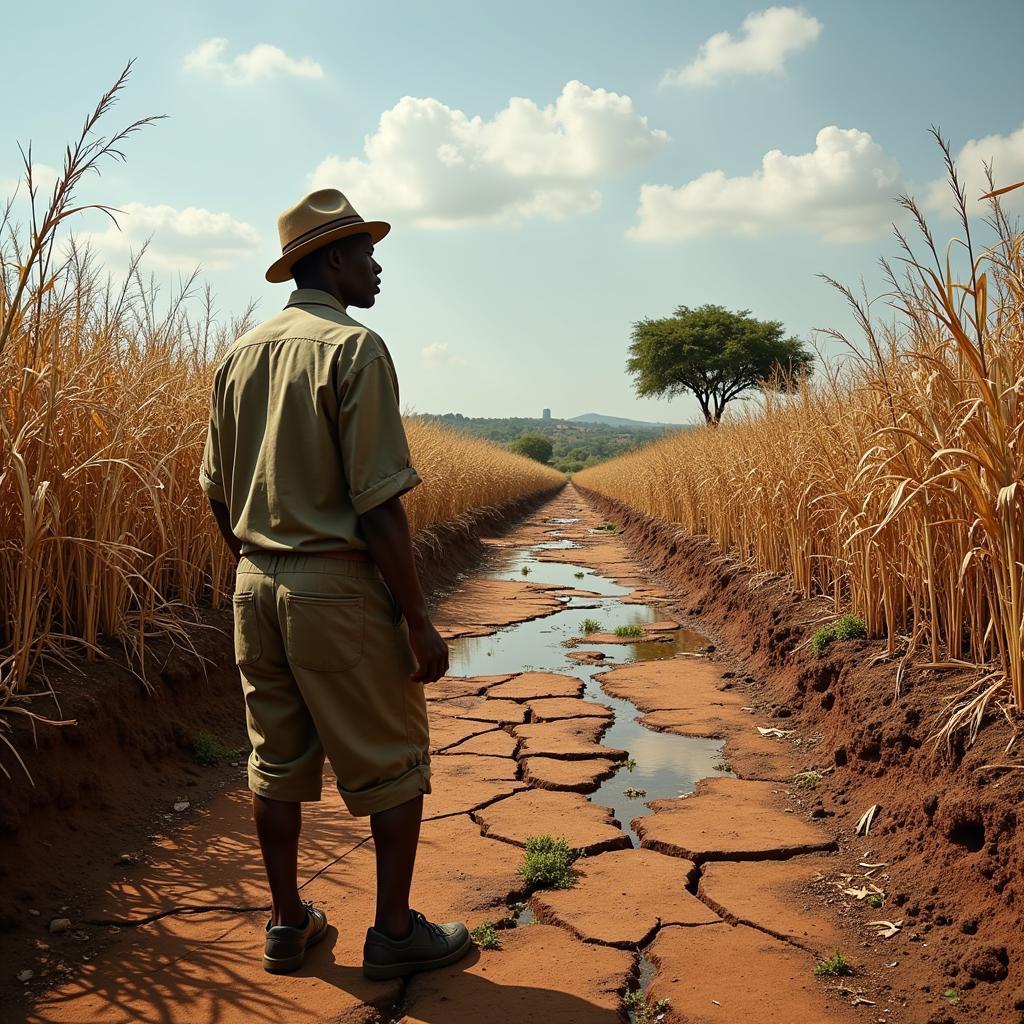The P plight of the African Farmer in Distress
The African Farmer In Distress is a recurring theme, a story woven into the very fabric of the continent’s agricultural landscape. From the Sahel to the Savannah, millions of farmers face immense challenges that threaten their livelihoods and food security for entire regions. These challenges are complex and interconnected, demanding comprehensive solutions that address the root causes of their vulnerability.
Understanding the Struggles of the African Farmer in Distress
Several factors contribute to the hardships faced by African farmers. These include climate change, limited access to markets, inadequate infrastructure, lack of access to finance, and the devastating impact of diseases on both crops and livestock. These factors, often compounded by political instability and conflict, create a perfect storm that pushes farmers to the brink.
One of the most pressing issues is the increasing unpredictability of weather patterns. Droughts, floods, and erratic rainfall are becoming more frequent and intense, devastating crops and wiping out entire herds. This makes it incredibly difficult for farmers to plan for the future and invest in their farms. Access to markets is another significant hurdle. Many farmers, particularly those in remote areas, lack the infrastructure and transportation needed to get their products to market, forcing them to sell at low prices to local middlemen or see their harvests rot.
The lack of access to finance also cripples many farmers. Without access to credit and loans, they are unable to invest in improved seeds, fertilizers, or modern farming techniques, trapping them in a cycle of low productivity and poverty. Diseases, both in crops and livestock, pose another significant threat. Outbreaks like African swine fever can decimate entire herds, wiping out years of investment and leaving farmers with nothing. Similarly, crop diseases can devastate harvests, leading to food shortages and economic hardship.
The Impact of Climate Change on African Farmers
Climate change is arguably the most significant long-term threat to African agriculture. The continent is particularly vulnerable to its effects, with many regions already experiencing increased temperatures, altered rainfall patterns, and more frequent extreme weather events. These changes have a devastating impact on crop yields, livestock production, and the overall resilience of farming communities.
 Climate change impact on African farms
Climate change impact on African farms
Access to Markets and Infrastructure Challenges
Limited access to markets and inadequate infrastructure further exacerbate the plight of the African farmer. Poor road networks, lack of storage facilities, and limited access to information technology make it difficult for farmers to get their products to market efficiently and profitably. This often results in post-harvest losses, reduced income, and limited opportunities for growth. Many farmers are forced to rely on informal markets and intermediaries, who often exploit their vulnerability and pay low prices for their produce.
Financial Constraints and Lack of Access to Credit
Access to finance is crucial for agricultural development, yet many African farmers struggle to secure the necessary funding to invest in their farms. Traditional lending institutions often require collateral that smallholder farmers cannot provide. This lack of access to credit prevents farmers from adopting improved farming practices, investing in new technologies, and expanding their operations. The lack of financial resources also leaves them vulnerable to shocks, such as droughts and disease outbreaks, which can push them further into poverty.
Solutions and Hope for the Future
Despite the numerous challenges, there is hope for the future of African agriculture. Innovative solutions and initiatives are emerging that address the root causes of the farmers’ distress. These include promoting climate-resilient agriculture, investing in rural infrastructure, improving access to finance, and strengthening farmer organizations.
Investing in irrigation systems, promoting drought-resistant crops, and providing farmers with access to weather information can help them adapt to the changing climate. Improving road networks, building storage facilities, and developing efficient market linkages can connect farmers to larger markets and increase their incomes. Innovative financial products, such as microloans and crop insurance, can provide farmers with the capital they need to invest in their farms and mitigate risks.
One crucial aspect is empowering farmers through education and training. Providing them with the knowledge and skills to implement sustainable farming practices, manage their finances effectively, and access market information can significantly improve their livelihoods. For instance, learning about african swine fever symptoms can help farmers protect their livestock and prevent devastating outbreaks. Similarly, understanding the best practices for african boer goat farm can boost productivity and profitability.
Dr. Amina Ali, an agricultural economist based in Nairobi, Kenya, emphasizes, “Investing in African farmers is not just about charity; it’s about building a more resilient and prosperous future for the entire continent. Empowering them with the tools and resources they need is essential for achieving food security and sustainable development.”
Professor Kwame Nkrumah, an agricultural scientist at the University of Ghana, adds, “African farmers hold the key to unlocking the continent’s agricultural potential. By addressing the challenges they face, we can unleash a wave of innovation and growth that will benefit generations to come.”
Conclusion
The African farmer in distress faces a complex web of challenges, but there is hope for a brighter future. By working together, governments, NGOs, and the international community can support African farmers in building resilient and sustainable livelihoods. Investing in agriculture is not just about feeding a continent; it’s about investing in its future. Addressing the plight of the African farmer in distress is crucial for ensuring food security, promoting economic growth, and building a more stable and prosperous future for Africa.
FAQs
-
What are the main challenges facing African farmers?
Climate change, lack of access to markets and finance, inadequate infrastructure, and disease outbreaks. -
How does climate change affect African agriculture?
It leads to more frequent and intense droughts, floods, and erratic rainfall, impacting crop yields and livestock production. -
What can be done to improve access to markets for African farmers?
Investing in rural infrastructure, such as roads and storage facilities, and developing efficient market linkages. -
How can access to finance be improved for African farmers?
Developing innovative financial products, such as microloans and crop insurance, tailored to the needs of smallholder farmers. -
What is the role of technology in supporting African farmers?
Technology can provide access to weather information, market prices, and best practices for sustainable agriculture. -
How can we support African farmers in building resilient livelihoods?
By promoting climate-resilient agriculture, investing in rural infrastructure, improving access to finance, and strengthening farmer organizations. -
Why is investing in African agriculture important?
It’s crucial for ensuring food security, promoting economic growth, and building a more stable and prosperous future for Africa.
Common Scenarios
- Scenario: A maize farmer in the Sahel region experiences a prolonged drought that destroys his entire crop.
- Scenario: A livestock farmer in East Africa loses his herd due to an outbreak of African swine fever.
- Scenario: A smallholder farmer in West Africa struggles to get her produce to market due to poor road conditions.
Related Questions and Resources
- What are the best practices for sustainable agriculture in Africa?
- How can we empower women farmers in Africa?
- What is the role of agricultural research in addressing the challenges faced by African farmers?
For support, please contact us: Phone: +255768904061, Email: kaka.mag@gmail.com or visit us at Mbarali DC Mawindi, Kangaga, Tanzania. Our customer service team is available 24/7.


